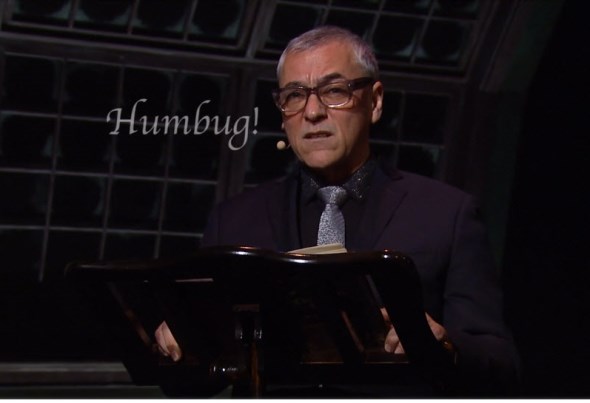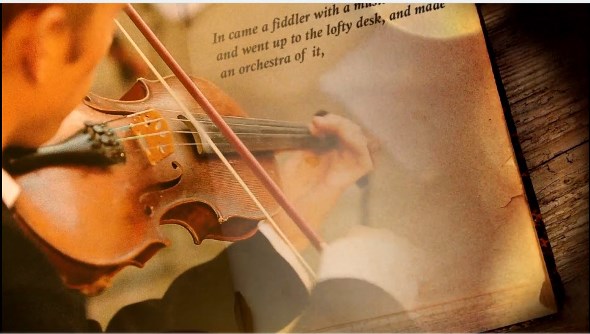In his one-man reading of ‘A Christmas Carol,’ Halberstam lets Dickens spark the imagination

Scrooge was horrid, to begin with. Michael Halberstam, artistic director at Writers Theatre, streams a one-man reading of Dickens’ “A Christmas Carol.” (Images courtesy of Writers)
Interview: Writers’ artistic director reflects on his streamed journey across the harrowing, redemptive nightscape of Ebenezer Scrooge.
By Lawrence B. Johnson
If actors are vessels for the characters they portray, Michael Halberstam has made of himself a grand repository of the diverse populace – living, deceased, earthly and unearthly – immortalized in Charles Dickens’ “A Christmas Carol.” Halberstam, the founding artistic director of Writers Theatre, reads the story, or perhaps inhabits it, all alone in a streamed performance that runs through Jan. 3.
As Halberstam hastens to emphasize, his “Christmas Carol” is no nose-in-the-book recitation, but rather a fully produced video that strives to put the reader – for he is indeed reading – at the fulcrum of a charged drama that invokes spirits, plain folk and a covetous old sinner who has cut himself off from the world.
Through stylized video overlays that echo passages of the text, in literal displays of Dickens’ words as Halberstam reads them and in the actor’s own movements about the stage, the unfolding story is animated even without the multitude of a staged play.
“Dickens’ original narrative is so rich in a way that stimulates the imagination,” Halberstam says. “Stagings and film show you everything, but the simple act of reading – or listening to — the author’s words forces you to create all these images for yourself.”
Halberstam, who first tackled “A Christmas Carol” as an unassisted reading some 30 years ago, says the success of such a narrative must be measured by how powerfully listeners are moved to reflect on their own lives and choices.
“The three Spirits grant Scrooge what people who lack a sense of themselves never get. They take him outside of himself, allowing him to observe his own life’s course from an outgoing young man to the old sinner he becomes. Scrooge is like a lot of people, going through the world absolutely sure of themselves with no idea of who they are.”
Just as one must understand clearly that Scrooge’s old partner Jacob Marley is dead from the outset, or nothing wonderful can come of the story, Halberstam says the book’s central premise is no less certain: that mankind is one’s business, and that generosity of spirit and means can achieve great good in this world.
“Scrooge has done nothing with the resources he has accumulated except to accumulate more,” the actor says. “Marley’s ghost brings him up short. The accumulation of wealth will not profit his soul one little bit if he doesn’t reach out to his fellow man. We all want to see ourselves as heroes, but Scrooge is an anti-hero, so we’re all screaming for him to break through.”
The plugging, honest, underpaid everyman Dickens sets up as foil to the callous Scrooge is his clerk Bob Cratchit. “I do a north country accent for Bob and his wife,” says Halberstam. “He’s stuck in this job where working conditions are abusive with no prospects, a family to feed and a son (the lame Tiny Tim) with special needs,” says Halberstam. “What Tiny Tim probably most needs is just proper nutrition and basic medication. But Cratchit’s family lives in poverty. What finally cracks through Scrooge’s veneer is his realization of what the loss of Tiny Tim will cost Cratchit.”
But basic to a reading, says Halberstam, is an understanding that Scrooge does not have a sudden revelation. There is no epiphany, no aha! moment. Scrooge’s transformation – his reclamation, as the Ghost of Christmas Past puts it – is progressive, and the first intimations of this change come early. But in the bleak, silent and unbending specter of the Ghost of Christmas Yet to Come, he clearly grasps the awful fate that awaits him if he does not change his ways.
“At that moment, when Scrooge sees his own gravestone, he is confronted by his mortality,” says Halberstam, “but he also sees that he has both the opportunity to make amends and the resources to be able to do it. It’s quite extraordinary.”
The payoff for Scrooge is the discovery that, as he observes with equal parts of amazement and delight, the Spirits have done it all in one night.
He hasn’t missed Christmas Day.
“The revelation morning is so well constructed by Dickens,” says Halberstam. “The audience is shocked by the things Scrooge has said and done, but they also can see his pain and disappointment.
“By now he is desperate to be given a second chance. He’s completely transformed. It’s a wonderful, wonderful, wonderful moment. The transformation scene is a bit long, so I took out some of the lines. Then I put them all back in. It’s all essential. All of it.”





